牛顿简介【英文】
牛顿的生平及成就英文简介
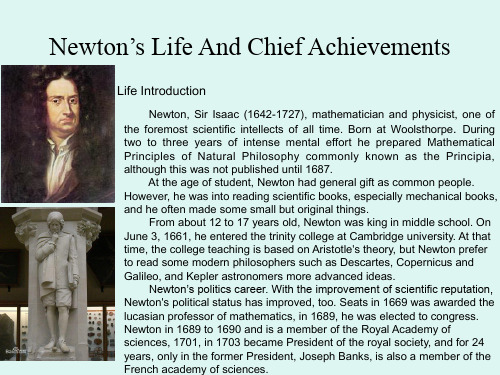
In Optics
The publication of Optics, largely written by 1692, was delayed by Newton until the critics were dead. The book was still imperfect: the colors of diffraction defeated Newton. Nevertheless, Optics established itself, from about 1715, as a model of the interweaving of theory with quantitative experimentation .
Newton’s Life And Chief Achievements
Life Introduction
Newton, Sir Isaac (1642-1727), mathematician and physicist, one of the foremost scientific intellects of all time. Born at Woolsthorpe. During two to three years of intense mental effort he prepared Mathematical Principles of Natural Philosophy commonly known as the Principia, although this was not published until 1687. At the age of student, Newton had general gift as common people. However, he was into reading scientific books, especially mechanical books, and he often made some small but original things. From about 12 to 17 years old, Newton was king in middle school. On June 3, 1661, he entered the trinity college at Cambridge university. At that time, the college teaching is based on Aristotle's theory, but Newton prefer to read some modern philosophers such as Descartes, Copernicus and Galileo, and Kepler astronomers more advanced ideas. Newton’s politics career. With the improvement of scientific reputation, Newton's political status has improved, too. Seats in 1669 was awarded the lucasian professor of mathematics, in 1689, he was elected to congress. Newton in 1689 to 1690 and is a member of the Royal Academy of sciences, 1701, in 1703 became President of the royal society, and for 24 years, only in the former President, Joseph Banks, is also a member of the French academy of sciences.
英语作文介绍牛顿
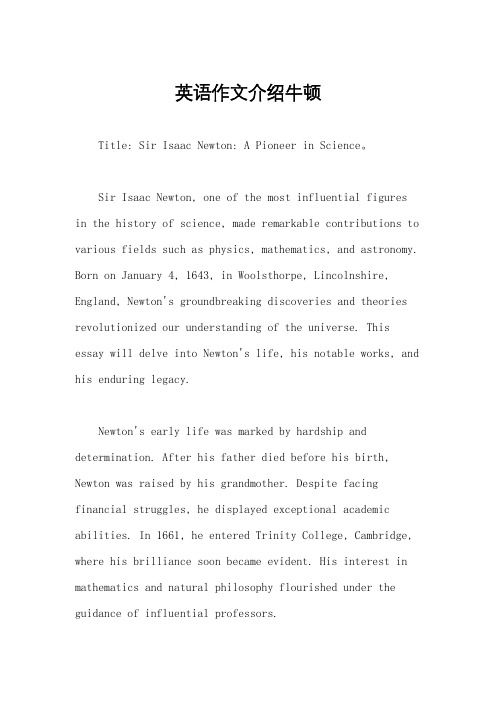
英语作文介绍牛顿Title: Sir Isaac Newton: A Pioneer in Science。
Sir Isaac Newton, one of the most influential figures in the history of science, made remarkable contributions to various fields such as physics, mathematics, and astronomy. Born on January 4, 1643, in Woolsthorpe, Lincolnshire, England, Newton's groundbreaking discoveries and theories revolutionized our understanding of the universe. This essay will delve into Newton's life, his notable works, and his enduring legacy.Newton's early life was marked by hardship and determination. After his father died before his birth, Newton was raised by his grandmother. Despite facing financial struggles, he displayed exceptional academic abilities. In 1661, he entered Trinity College, Cambridge, where his brilliance soon became evident. His interest in mathematics and natural philosophy flourished under the guidance of influential professors.One of Newton's most renowned achievements is his formulation of the laws of motion and the law of universal gravitation. In 1687, he published his magnum opus, "Philosophiæ Naturalis Principia Mathematica" (Mathematical Principles of Natural Philosophy), commonly known as the Principia. In this monumental work, Newton presented his three laws of motion, which laid the foundation for classical mechanics. He also proposed the law of universal gravitation, stating that every particle of matter in the universe attracts every other particle with a force proportional to the product of their masses and inversely proportional to the square of the distance between their centers. This revolutionary concept provided a unified explanation for celestial and terrestrial motion.Moreover, Newton made significant contributions to the field of optics. He conducted experiments with prisms, demonstrating that white light is composed of a spectrum of colors. Newton's work on optics culminated in his publication of "Opticks" in 1704, where he introduced his theory of color and the corpuscular theory of light. Hisexperiments and theories laid the groundwork for the wave-particle duality of light, a fundamental concept in modern physics.In addition to his scientific endeavors, Newton served as the Warden and later as the Master of the Royal Mint. During his tenure, he implemented measures to combat counterfeiting and stabilize the English currency. His administrative skills and dedication to public service earned him widespread recognition and praise.Newton's legacy extends far beyond his scientific achievements. His methodical approach to inquiry, characterized by rigorous experimentation and mathematical analysis, became the hallmark of modern science. The principles and laws he established laid the groundwork for subsequent scientific advancements and continue to influence scientists and researchers to this day.Furthermore, Newton's work laid the foundation for the Age of Enlightenment, a period marked by intellectual and philosophical advancements. His emphasis on empiricalevidence and rational inquiry inspired thinkers to question traditional beliefs and seek knowledge through observation and experimentation.In conclusion, Sir Isaac Newton's profound impact on science, mathematics, and philosophy is undeniable. His laws of motion, law of universal gravitation, and contributions to optics revolutionized our understanding of the natural world. Beyond his scientific achievements, Newton's legacy embodies the spirit of inquiry and discovery that continues to drive progress in science and society. As we reflect on his life and work, we recognize Newton as a true pioneer whose legacy endures through the ages.。
牛顿英文简介

Mathematics
In 1704, developed infinitesimal calculus. (Leibniz 1684) Newton is generally credited with:
the generalised binomial theorem, valid for any exponent. He discovered Newton's identities, Newton's method classified cubic plane curves (polynomials of degree three in two variables) made substantial contributions to the theory of finite differences was the first to use fractional indices He approximated partial sums of the harmonic series by logarithms was the first to use power series with confidence and to revert power series.
Bio
n April 1705, Queen Anne knighted Newton during a royal visit to Trinity College, Cambridge. 1717, Newton moved the Pound Sterling de facto from the silver standard to the gold standard. Newton died in his sleep in London on 31 March 1727. After his death, Newton's body was discovered to have had massive amounts of mercury in it. Mercury poisoning could explain Newton's eccentricity in late life.
介绍牛顿的英语作文
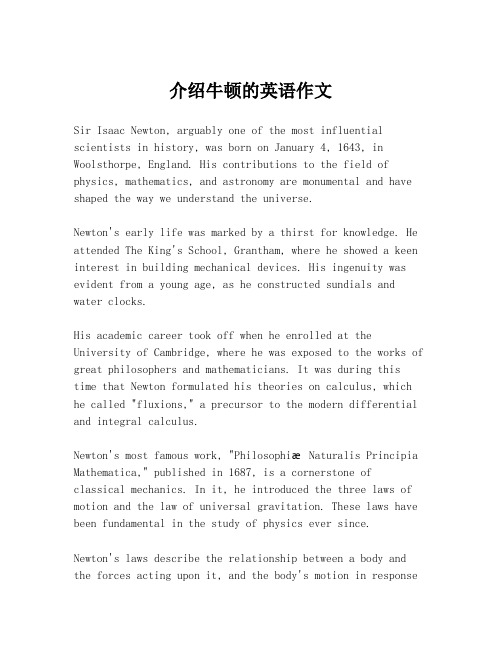
介绍牛顿的英语作文Sir Isaac Newton, arguably one of the most influential scientists in history, was born on January 4, 1643, in Woolsthorpe, England. His contributions to the field of physics, mathematics, and astronomy are monumental and have shaped the way we understand the universe.Newton's early life was marked by a thirst for knowledge. He attended The King's School, Grantham, where he showed a keen interest in building mechanical devices. His ingenuity was evident from a young age, as he constructed sundials and water clocks.His academic career took off when he enrolled at the University of Cambridge, where he was exposed to the works of great philosophers and mathematicians. It was during this time that Newton formulated his theories on calculus, which he called "fluxions," a precursor to the modern differential and integral calculus.Newton's most famous work, "Philosophiæ Naturalis Principia Mathematica," published in 1687, is a cornerstone ofclassical mechanics. In it, he introduced the three laws of motion and the law of universal gravitation. These laws have been fundamental in the study of physics ever since.Newton's laws describe the relationship between a body and the forces acting upon it, and the body's motion in responseto those forces. His first law, the law of inertia, statesthat an object at rest stays at rest and an object in motion stays in motion with the same speed and in the same direction unless acted upon by an unbalanced force. The second law, which introduces the concept of force, states that the acceleration of an object is directly proportional to the net force acting on it and inversely proportional to its mass.The third law, often quoted as "for every action, there is an equal and opposite reaction," explains how forces alwaysoccur in pairs.In addition to his work in physics, Newton made significant contributions to the field of optics. He conductedexperiments with prisms and concluded that white light is composed of a spectrum of colors. His work led to the development of the reflecting telescope, which was an improvement over the existing refracting telescopes.Newton's life was not without controversy. He had several intellectual disputes with other scientists, most notablywith Gottfried Wilhelm Leibniz over the invention of calculus. Despite these conflicts, his work has stood the test of time and continues to be a foundation for modern science.Newton passed away on March 31, 1727, but his legacy lives on. His theories have been built upon and expanded by countless scientists, and his name is synonymous with the very conceptof scientific genius. Today, Newton's work is celebrated as a testament to human curiosity and the pursuit of knowledge,and he remains an inspiration to students and scholars alike.。
介绍牛顿的一生英语作文

介绍牛顿的一生英语作文English:Sir Isaac Newton was a renowned English mathematician, physicist, and astronomer who made significant contributions to the fields of mathematics, physics, and astronomy. Born on January 4, 1643, in Woolsthorpe, Lincolnshire, Newton grew up in a farming household and showed an early aptitude for scientific and mathematical subjects. He attended the University of Cambridge, where he developed his theories on calculus, optics, and the laws of motion. Newton's most famous work, Principia Mathematica, published in 1687, laid the foundation for classical mechanics and his three laws of motion revolutionized the way we understand the physical world. Throughout his life, Newton made numerous groundbreaking discoveries in mathematics and science and was eventually knighted by Queen Anne in 1705 for his contributions. He died on March 31, 1727, leaving behind a legacy as one of the greatest scientists in history.中文翻译:艾萨克·牛顿爵士是一位著名的英国数学家、物理学家和天文学家,在数学、物理和天文学领域做出了重大贡献。
介绍牛顿的英语作文
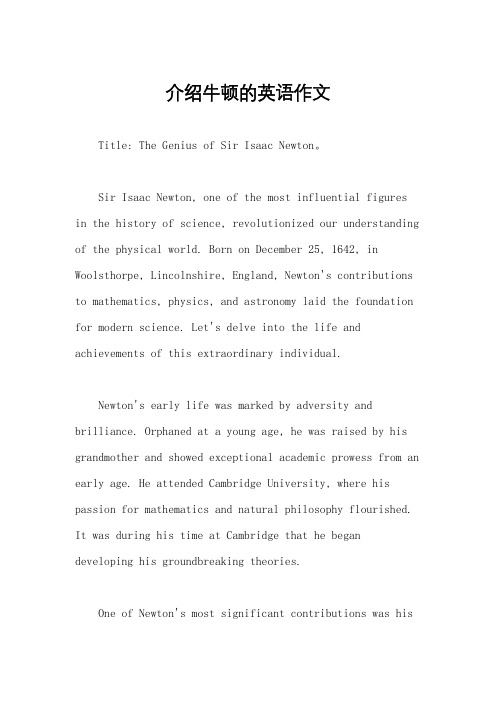
介绍牛顿的英语作文Title: The Genius of Sir Isaac Newton。
Sir Isaac Newton, one of the most influential figuresin the history of science, revolutionized our understanding of the physical world. Born on December 25, 1642, in Woolsthorpe, Lincolnshire, England, Newton's contributions to mathematics, physics, and astronomy laid the foundation for modern science. Let's delve into the life and achievements of this extraordinary individual.Newton's early life was marked by adversity and brilliance. Orphaned at a young age, he was raised by his grandmother and showed exceptional academic prowess from an early age. He attended Cambridge University, where his passion for mathematics and natural philosophy flourished. It was during his time at Cambridge that he began developing his groundbreaking theories.One of Newton's most significant contributions was hiswork on calculus, which he developed simultaneously with German mathematician Gottfried Wilhelm Leibniz. Hisinsights into the principles of calculus provided a powerful mathematical framework for understanding motion and change, laying the groundwork for much of modern physics.However, Newton's most famous contribution came in the form of his laws of motion and the universal law of gravitation. In his seminal work "Philosophiæ Naturalis Principia Mathematica" (Mathematical Principles of Natural Philosophy), published in 1687, Newton outlined his three laws of motion, which describe the relationship between the motion of an object and the forces acting on it. These laws revolutionized our understanding of mechanics and paved the way for countless technological advancements.Yet, perhaps Newton's most profound insight was his law of universal gravitation. By proposing that every object in the universe attracts every other object with a force proportional to their masses and inversely proportional to the square of the distance between them, Newton provided aunified explanation for celestial motion. This law not only explained Kepler's laws of planetary motion but also provided a framework for understanding the behavior of celestial bodies throughout the cosmos.Newton's contributions to astronomy were equally groundbreaking. He constructed the first practical reflecting telescope, known as the Newtonian telescope, which revolutionized astronomical observation. With this instrument, Newton made significant discoveries about the nature of light and optics, laying the groundwork for the field of spectroscopy and advancing our understanding of the universe.In addition to his scientific achievements, Newton was also deeply involved in alchemy and theology. He spent years conducting experiments in alchemy, searching for the philosopher's stone and the elixir of life. While his alchemical pursuits may seem at odds with his scientific rigor, they were reflective of the intellectual pursuits of his time.Newton's impact on the world cannot be overstated. His work laid the foundation for the scientific revolution of the 17th and 18th centuries and set the stage for the modern scientific method. His laws of motion and universal gravitation remain cornerstones of physics, guiding our understanding of the universe to this day.In conclusion, Sir Isaac Newton's contributions to science and mathematics were truly monumental. His insights into calculus, mechanics, and astronomy revolutionized our understanding of the physical world and paved the way for centuries of scientific progress. His legacy serves as a testament to the power of human curiosity, ingenuity, and perseverance in unlocking the mysteries of the universe.。
牛顿英文作文40词
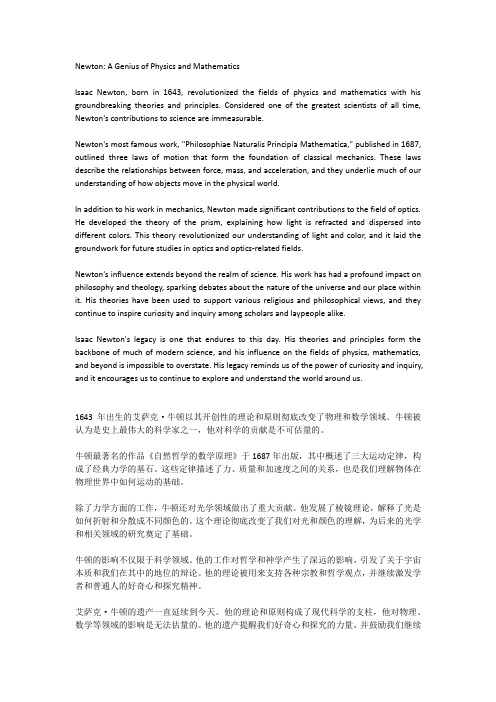
Newton: A Genius of Physics and MathematicsIsaac Newton, born in 1643, revolutionized the fields of physics and mathematics with his groundbreaking theories and principles. Considered one of the greatest scientists of all time, Newton's contributions to science are immeasurable.Newton's most famous work, "Philosophiae Naturalis Principia Mathematica," published in 1687, outlined three laws of motion that form the foundation of classical mechanics. These laws describe the relationships between force, mass, and acceleration, and they underlie much of our understanding of how objects move in the physical world.In addition to his work in mechanics, Newton made significant contributions to the field of optics. He developed the theory of the prism, explaining how light is refracted and dispersed into different colors. This theory revolutionized our understanding of light and color, and it laid the groundwork for future studies in optics and optics-related fields.Newton's influence extends beyond the realm of science. His work has had a profound impact on philosophy and theology, sparking debates about the nature of the universe and our place within it. His theories have been used to support various religious and philosophical views, and they continue to inspire curiosity and inquiry among scholars and laypeople alike.Isaac Newton's legacy is one that endures to this day. His theories and principles form the backbone of much of modern science, and his influence on the fields of physics, mathematics, and beyond is impossible to overstate. His legacy reminds us of the power of curiosity and inquiry, and it encourages us to continue to explore and understand the world around us.1643年出生的艾萨克·牛顿以其开创性的理论和原则彻底改变了物理和数学领域。
牛顿英语作文介绍

牛顿英语作文介绍Newton: A Genius of Physics and MathematicsIsaac Newton, born in 1643, England, revolutionized the fields of physics and mathematics with his groundbreaking theories and discoveries. Considered one of the greatest scientists of all time, Newton's contributions to science are immeasurable.Newton's journey to greatness began when he was a child. He demonstrated a keen interest in science and mathematics from a very young age, often creating models and experiments to satisfy his curiosity. However, his childhood was not entirely smooth. He lost his father at an early age and faced financial difficulties, which forced him to leave school and work on a farm. Despite these challenges, Newton's passion for science never dimmed.His most famous work, "Philosophiae Naturalis Principia Mathematica," published in 1687, outlined three laws of motion that are still taught in schools today. These laws explained the principles of gravity, inertia, and force, laying the foundation for classical mechanics. Newton's work in optics, particularly his discovery of the prism and its ability to split light into different colors, revolutionized the field of optics.Newton's influence extends far beyond the realm of science. His work has had a profound impact on philosophy, religion, and even economics. His theories on gravity and the universe provided a scientific basis for the belief in a rational and orderly God. His work also influenced the development of calculus, a branch of mathematics that has found applications in various fields, from engineering to economics.Isaac Newton's life and work are a testament to the power of curiosity, perseverance, and the ability to see beyond the obvious. His theories and discoveries have shaped the way we understand the universe and have left an indelible mark on the history of science.牛顿:物理和数学的天才艾萨克·牛顿,1643年出生于英国,他以其开创性的理论和发现彻底改变了物理和数学领域。
牛顿的简介作文英文

牛顿的简介作文英文英文:Newton, one of the most famous scientists in history, was born in 1642 in England. He is known for his contributions to physics, mathematics, and astronomy. He developed the laws of motion and universal gravitation, which revolutionized our understanding of the natural world.As a child, Newton was not particularly interested in academics. However, he was fascinated by mechanics andspent much of his time building machines and experimenting with them. Later, he attended Trinity College at the University of Cambridge, where he studied mathematics and became interested in the works of Galileo and Descartes.In 1687, Newton published his most famous work, "Mathematical Principles of Natural Philosophy," which laid out his laws of motion and universal gravitation. Theselaws explained how objects move and interact with eachother in the universe, and they have been used to make countless scientific discoveries since then.One of the most famous stories about Newton is thestory of the apple falling on his head, which supposedly inspired him to discover the laws of gravity. While this story may be apocryphal, it is true that Newton wasinspired by observing the natural world and trying to understand its workings.Overall, Newton's contributions to science have been immeasurable. His work laid the foundation for modern physics and helped us to understand the universe in a way that was previously unimaginable.中文:牛顿是历史上最著名的科学家之一,于1642年出生在英格兰。
介绍牛顿的英语文章
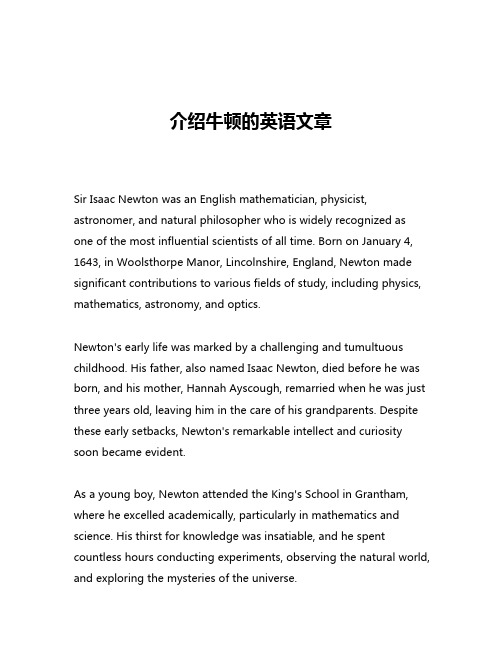
介绍牛顿的英语文章Sir Isaac Newton was an English mathematician, physicist, astronomer, and natural philosopher who is widely recognized as one of the most influential scientists of all time. Born on January 4, 1643, in Woolsthorpe Manor, Lincolnshire, England, Newton made significant contributions to various fields of study, including physics, mathematics, astronomy, and optics.Newton's early life was marked by a challenging and tumultuous childhood. His father, also named Isaac Newton, died before he was born, and his mother, Hannah Ayscough, remarried when he was just three years old, leaving him in the care of his grandparents. Despite these early setbacks, Newton's remarkable intellect and curiosity soon became evident.As a young boy, Newton attended the King's School in Grantham, where he excelled academically, particularly in mathematics and science. His thirst for knowledge was insatiable, and he spent countless hours conducting experiments, observing the natural world, and exploring the mysteries of the universe.After completing his early education, Newton enrolled at the University of Cambridge, where he would go on to make some of his most groundbreaking discoveries. At Cambridge, Newton immersed himself in the study of mathematics, optics, and natural philosophy, laying the foundation for his future achievements.One of Newton's most famous contributions to science was his development of the three laws of motion, which have become the cornerstone of classical mechanics. These laws, known as Newton's Laws of Motion, describe the relationship between an object and the forces acting upon it, and they have had a profound impact on our understanding of the physical world.In addition to his work on mechanics, Newton made significant contributions to the field of optics. He conducted extensive experiments on the nature of light, including the famous prism experiment, which demonstrated that white light is composed of a spectrum of colors. Newton's work on optics also led to the development of the reflecting telescope, which revolutionized astronomical observations.Perhaps Newton's most famous and influential work was his masterpiece, the "Philosophiæ Naturalis Principia Mathematica," or "Mathematical Principles of Natural Philosophy," published in 1687.In this seminal work, Newton presented his theory of universal gravitation, which explained the motion of celestial bodies and the forces that govern the universe. The Principia, as it is commonly known, is widely regarded as one of the most important scientific works of all time, and it established Newton as the father of modern physics.Throughout his life, Newton's scientific pursuits were not limited to physics and mathematics. He also made significant contributions to the field of astronomy, including the development of a new system for calculating the orbits of comets and the discovery of the true shape of the Earth, which he determined to be an oblate spheroid rather than a perfect sphere.Beyond his scientific achievements, Newton was also a skilled alchemist and theologian. He spent a considerable amount of time studying the nature of matter and the secrets of the universe, and he was deeply interested in the study of religion and philosophy. Newton's religious beliefs were complex and often misunderstood, but he was a devout Christian who grappled with questions of faith and the nature of God.Despite his many accomplishments, Newton's life was not without its challenges. He was known to be temperamental and could be fiercely competitive, often engaging in bitter feuds with otherscientists and scholars. His later years were marked by periods of ill health and depression, and he struggled with the demands of his various roles and responsibilities.Nevertheless, Newton's legacy as one of the most influential scientists in history is undeniable. His groundbreaking discoveries and theories have shaped our understanding of the physical world and have had a lasting impact on the fields of physics, mathematics, astronomy, and beyond. Today, Newton's name is synonymous with scientific excellence and the relentless pursuit of knowledge.In conclusion, Sir Isaac Newton was a true giant of science, whose contributions to our understanding of the universe have stood the test of time. His life and work continue to inspire and captivate scholars and scientists around the world, and his legacy will undoubtedly endure for generations to come.。
牛顿英文简介

牛顿英文简介艾萨克牛顿,英国出名的物理学家,百科全书式的“全才”,下面是我给大家整理的牛顿英文简介,供大家参阅!艾萨克牛顿人物生平TeenagerOn January 4, 1643, Isaac Newton was born in the Woolsthorpe manor in a small village of Woolthorpe village in Lincolnshire, England. At the time of Newtons birth, England did not use the Popes latest calendar, so his birthday was recorded as Christmas in 1642. Newton was born three months before, he also named Isaacs father had just died. It was rumored that his mother, Hannah Ayscough, had said that Newton was born when he was small enough to put him in a quart of mugs. When Newton was three years old, his mother remarried and housed the home of the new husband Barnabus Smith, and entrusted Newton to his grandmother Margery Ayscough, The Young Newton did not like his stepfather and had some hostility to his mother because of his mother s remarriage, and Newton had even written: threaten my stepfather and mother, and burn them together with the house.In 1648, Newton was sent to study. Junior Newton is not a child prodigy, his performance in general, but he likes to read, like to see some of the simple mechanical model production methods of reading, and inspired by their own hands to create some strange gadgets, such as windmills, Wooden bell, folding lanterns and so on.The legend of Newton touched the mechanical principle of the windmill, made a model of the mill, he tied the mouse to a wheeled treadmill, and then put a corn in front of the wheel, just that place is The mouse is inaccessible position. The mouse would like to eat corn, and constantly running, so the wheels kept turning; once again when he was flying a kite, hanging on the rope with a small light, the night the village looked surprised to see the comet appeared; he also made a small bell The Every morning, a small water clock will automatically drip into his face, urging him to get up. He also likes painting, sculpture, especially like carved sundials, home walls, windowsill everywhere placed with his portrayed sundial, to see the shadow of the move.school daysIn 1654, Newton went out of school with more than a dozen kilometers of Kowloons Kings Royal High School. Newtons mother had hoped that he would become a farmer, but Newton himself did not intend to, and love reading. With the increase in age, Newton more love to study, like meditation, do little science experiment. When he was studying at the Royal High School in Kingdez, he had been in a pharmacists home and had been influenced by chemical tests.Newton has a great academic record in the middle school, loves to study, curious about natural phenomena, such as color, shadows, especially geometric, Copernicus, and so on. He also categorized notes, and liked to ingeniously do small tools, tips, small inventions, small tests.At that time the British society infiltrated the new ideas of Christianity, Newton home with two priests as a professional relatives, which may be Newtons religious lifesuffered. Only from these ordinary environment and activities, but also do not see the young Newton is a different from ordinary people can be different children.Later forced to live difficulties, the mother to Newton suspended in the house farming, support the family. But Newton had the opportunity to bury the book, and even forget to work. Every time the mother told him to join the servant with the servant, familiar with the business of doing business, he pleaded with the servant a person took to the streets, he hid in the grove after reading. Once again, Newtons uncle was suspicious, and he followed Newton on the town and found his nephew Newton stretched out his legs, lying on the grass, and concentrating on a math problem. Newtons eager mind touched the uncle, so uncle to persuade his mother to Newton school, and encouraged Newton to college. Newton returned to school again, eager to learn the nutrition of the book.According to the Men of Mathematics, ET Bell and An introduction to the history of mathematics, H. Eves Newton started school education in rural schools and was later sent to the King Middle School of Grantham and became the best student of the school. At Kings High School, he boarded the local pharmacist William (William Clarke), and at the age of 19 went to Cambridge University before the school, with the pharmacists stepfather Anne Stowler (Anne Storer) engagement. Later, because Newton focused on his research and make love cooling, Stole It is said that Newton had a good memory of the affair, but then there was no other romance, and Newton did not marry for life.However, according to the description of the book Memoirs of Sir Isaac NewtonsLife by William Stukeley, a friend of Newtons contemporary era, Strickley died after Newtons death Had visited Vincent (Madame Vincent), that is, Newtons lovers Miss Stole. The name of Mrs. Vincent is called Catherine, not Anne, Anne is her sister (see Arthur Storer), and the lady only said that Newton was the same time she waspregnant with the degree of only.From the age of 12 to 17 years old, Newton in the Royal High School in the study of gold, in the school library windowsill can also see his signature of the year. Hedropped out of school and returned to Elsopau in October 1659 because his widowed mother wanted Newton as a farmer. Newton, though obeying the mother, butaccording to Newtons peers later, the farming work made Newton quite unhappy.Henry Stokes, the principal of the Royal High School of King Kong, persuadedNewtons mother, who was sent back to school to finish his studies. He completed his studies at the age of 18 and got a perfect graduation report.June 3, 1661, he entered the Cambridge University Trinity College. At that time, the colleges teaching was based on Aristotles doctrine, but Newton preferred to read some of the modern philosophers such as Descartes and astronomers such as Galileo, Copernicus and Kepler. In 1665, he discovered the generalized binomial theorem and began to develop a new mathematical theory, that is, later known to the world of calculus. In 1665, Newton got a degree, and the university was shut down to prevent the Great Plague in London. Over the next two years, Newton continues to studycalculus, optics, and gravitational law at home.Political career2/ 4In 1669, was granted to Lucas Professor of Mathematics.In 1689 he was elected a member of Congress. Newton was a member of the Royal Academy of Sciences from 1689 to 1690 and 1701 and became president of the Royal Society in 1703 and worked for 24 years, after Joseph Becks, who was also president of the French Academy of Sciences Of the members.In 1696, Newton passed the administration of the then Chancellor of the Exchequer Charles Montague to move to London for the supervision of the Royal Mint, until death. He presided over the UKs largest money recast, the job is generally idle, but Newton is very serious treatment. As the chief executive of the Royal Mint, Newton estimates that about 20% of the coins are forged. It is very difficult to convict those infamous criminals; but it is proved that Newton is doing well. Newton became a gentleman.In 1705, Newton was called the Queen by Anne Queen.Newton wrote a lot of religious pamphlets that dealt with the text of the Bible in the 1670s. Henry Moores cosmic belief and refusal of Cartesian dualism influenced Newtons religious beliefs. In his never-published manuscript to John Locke, he disputed the existence of the Trinity.ResignationMarch 31, 1727 (Granville), the great Isaac Newton died, and many outstanding British people were buried in the Westminster Abbey. His tombstone engraved: Let people cheer such a great human glory has existed in the world.When the New Year in 1727, 85 years old died, the British buried him in Westminster. Westminsters predecessor is a monastery, in 1579, the British Queen Elizabeth I will Westminster to college, the principal appointed by the British monarch. Westminsters official name was changed to Westminster St. Peters College Church, after three centuries, Westminster became Oxford and Cambridge after the third British institutions of higher learning. The poet Alexander Pope wrote the following epitaph for Newton: Nature and Nature law lay hid in night; God said, Let Newton be, and all was light. The laws of nature and nature are hidden in the darkness; God says, Let Newton come! So everything turned bright.For more than nine hundred years, Westminster Abbey was an important place for the British celebration, except for worship, prayer and worship. British celebrities can be buried after death to this glory. According to statistics, the area covers an area of 2972 square meters of Westminster Temple (Westminster St. Peters College Church), buried a total of more than 3,300 people, including many contemporary celebrities, such as: Darwin, Dickens , Newton, Churchill ... ... countless people in the UK have far-reaching impact on the historical figures are resting in the Westminster Temple, there are many celebrities, itself is not buried here, there are written on the name of the stone plate embedded in the ground as a memorial. And the most famous inside is Newton, he is the first in the history of mankind to get the natural sciences of natural scientists.His cemetery is located in the center of the front hall of Westminster Abbey, that is, the nave, where the statue of a Newton statue stands above the cemetery, and the stone is sitting on a pile of books. There are two angels around, there is a huge earthshape to commemorate his achievements in science.No matter how many Newtons mysteries and controversies, but this is not enough to reduce Newtons influence. In 1726, Voltaire once said that Newton was the greatest man because he ruled our minds with the power of truth, rather than enslave us with force.In fact, if you look at the index of a science encyclopedia, you will find that Newton and his laws and found more than two to three times more than any scientist. Leibniz is not Newtons friend, and there have been very intense debates between them. But he wrote: From the beginning of the world to the time of Newtons life, the contribution to the development of mathematics is largely made by Newton. The great French scientist Laplace wrote: The principle is human wisdom The most outstanding masterpiece of the product. Lagrange often said Newton was the greatest genius ever.In the American scholar Mike Harts 100 people who affect the history of human history list, Newton ranked No. 2, second only to Muhammad. The book pointed out: in Newton after the birth of hundreds of years, peoples lifestyles found earth-shaking changes, and these changes are mostly based on Newtons theory and discovery. In the past 500 years, with the rise of modern science, most peoples daily life has undergone a revolutionary change. Compared with 1500 years ago, we wear different, different diet, work different, but also with them is that we have a lot of leisure time. Scientific discovery not only brings technological and economic revolution, it also completely changed the political, religious thought, art and philosophy.In 2021, the British Broadcasting Corporation was named one of the greatest British people in a global selection of the greatest British activities. The global public is aware that Newtons achievements are cosmopolitan and have an impact on all mankind, said Tristram Hunt, a historian who specializes in editing Newtons album in the Great British family documentary. These voters apparently crossed the borders, and he was happy with Newton s presence.牛顿英文简介相关4/ 4。
介绍牛顿的英语作文
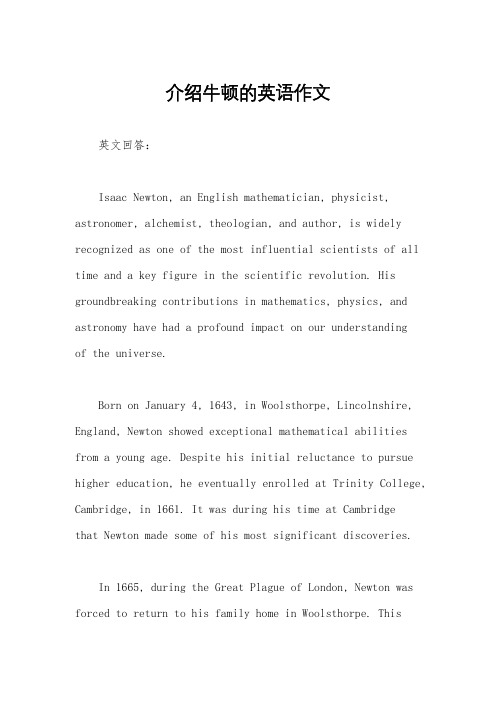
介绍牛顿的英语作文英文回答:Isaac Newton, an English mathematician, physicist, astronomer, alchemist, theologian, and author, is widely recognized as one of the most influential scientists of all time and a key figure in the scientific revolution. His groundbreaking contributions in mathematics, physics, and astronomy have had a profound impact on our understandingof the universe.Born on January 4, 1643, in Woolsthorpe, Lincolnshire, England, Newton showed exceptional mathematical abilities from a young age. Despite his initial reluctance to pursue higher education, he eventually enrolled at Trinity College, Cambridge, in 1661. It was during his time at Cambridgethat Newton made some of his most significant discoveries.In 1665, during the Great Plague of London, Newton was forced to return to his family home in Woolsthorpe. Thisperiod of isolation proved to be highly productive for Newton, and it was during this time that he developed his fundamental laws of motion and universal gravitation. These groundbreaking theories laid the foundation for classical mechanics and celestial mechanics, and they continue to be essential components of modern physics.After returning to Cambridge in 1667, Newton published his seminal work "Philosophiæ Naturalis Principia Mathematica" (Mathematical Principles of Natural Philosophy) in 1687. This masterpiece presented his three laws ofmotion and his law of universal gravitation, whichexplained the motion of celestial bodies and provided a unified framework for understanding the physical world.Newton's contributions to mathematics were equally significant. He developed the calculus, a powerful mathematical tool that revolutionized the fields of mathematics and physics. He also made importantcontributions to the study of optics, including his discovery of the composition of white light and the development of the reflecting telescope.Besides his scientific achievements, Newton was also deeply interested in theology and alchemy. He wrote extensively on biblical interpretation and the existence of God. Newton's religious beliefs influenced his scientific work, and he saw his discoveries as evidence of the harmony and order of the universe.Throughout his life, Newton received numerous honors and accolades for his scientific contributions. He was knighted by Queen Anne in 1705 and served as President of the Royal Society from 1703 to 1727.Isaac Newton's legacy is immense. His groundbreaking discoveries in mathematics, physics, and astronomy laid the foundation for modern science, and his ideas continue to inspire and challenge scientists to this day. His name remains synonymous with scientific genius and his contributions to the advancement of human knowledge are immeasurable.中文回答:牛顿简介。
牛顿(Isaac Newton)英文简介

Newton, Sir Isaac (1642-1727)
Mathematician and physicist, one of the foremost scientific intellects of all time. Born at Woolsthorpe, near Grantham in Lincolnshire, where he attended school, he entered Cambridge University in 1661; he was elected a Fellow of Trinity College in 1667, and Lucasian Professor of Mathematics in 1669. He remained at the university, lecturing in most years, until 1696. Of these Cambridge years, in which Newton was at the height of his creative power, he singled out 1665-1666 (spent largely in Lincolnshire because of plague in Cambridge) as "the prime of my age for invention". During two to three years of intense mental effort he prepared Philosophiae Naturalis Principia Mathematica (Mathematical Principles of Natural Philosophy) commonly known as the Principia, although this was not published until 1687.
英语作文介绍牛顿
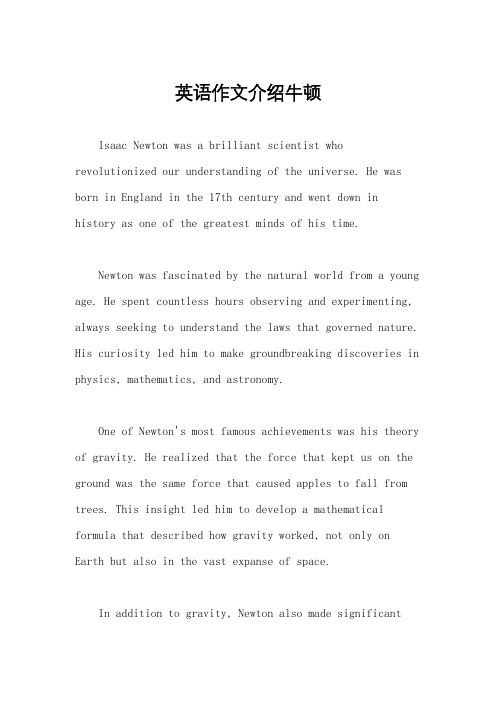
英语作文介绍牛顿Isaac Newton was a brilliant scientist who revolutionized our understanding of the universe. He was born in England in the 17th century and went down inhistory as one of the greatest minds of his time.Newton was fascinated by the natural world from a young age. He spent countless hours observing and experimenting, always seeking to understand the laws that governed nature. His curiosity led him to make groundbreaking discoveries in physics, mathematics, and astronomy.One of Newton's most famous achievements was his theory of gravity. He realized that the force that kept us on the ground was the same force that caused apples to fall from trees. This insight led him to develop a mathematical formula that described how gravity worked, not only on Earth but also in the vast expanse of space.In addition to gravity, Newton also made significantcontributions to optics. He studied the behavior of light and how it interacted with different materials. His work on the reflection and refraction of light helped pave the way for the development of telescopes and other optical instruments.Despite his brilliant mind, Newton was also known for his quirky personality. He was often described as a loner who preferred to work alone rather than collaborate with others. However, this didn't stop him from making some of the most important scientific discoveries of his era.In conclusion, Isaac Newton was a brilliant scientist who changed the way we understand the universe. His work in physics, mathematics, and optics has had a lasting impact on science and technology. Even though he was a。
介绍牛顿的英语作文
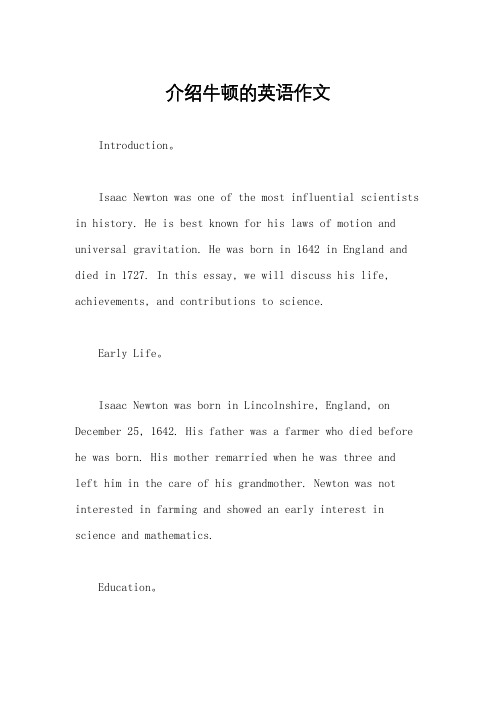
介绍牛顿的英语作文Introduction。
Isaac Newton was one of the most influential scientists in history. He is best known for his laws of motion and universal gravitation. He was born in 1642 in England and died in 1727. In this essay, we will discuss his life, achievements, and contributions to science.Early Life。
Isaac Newton was born in Lincolnshire, England, on December 25, 1642. His father was a farmer who died before he was born. His mother remarried when he was three andleft him in the care of his grandmother. Newton was not interested in farming and showed an early interest in science and mathematics.Education。
Newton attended the University of Cambridge, where he studied mathematics, physics, and astronomy. He was a brilliant student and made many important discoveries while he was there. He discovered the binomial theorem and developed calculus, which is a branch of mathematics that deals with rates of change and slopes of curves.Achievements。
英语作文介绍牛顿
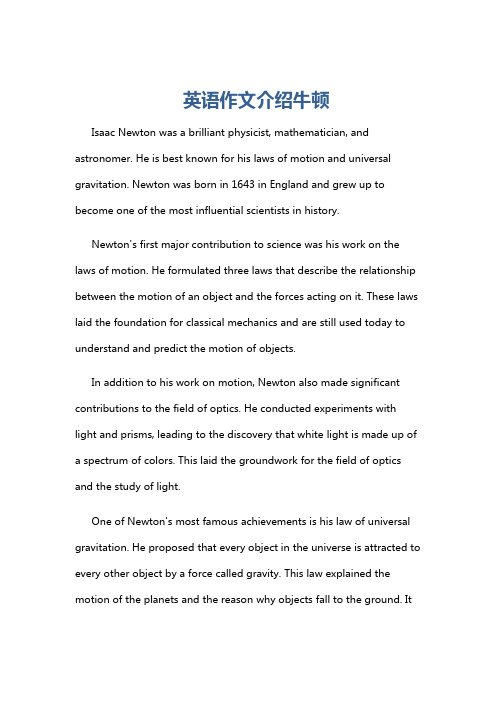
英语作文介绍牛顿Isaac Newton was a brilliant physicist, mathematician, and astronomer. He is best known for his laws of motion and universal gravitation. Newton was born in 1643 in England and grew up to become one of the most influential scientists in history.Newton's first major contribution to science was his work on the laws of motion. He formulated three laws that describe the relationship between the motion of an object and the forces acting on it. These laws laid the foundation for classical mechanics and are still used today to understand and predict the motion of objects.In addition to his work on motion, Newton also made significant contributions to the field of optics. He conducted experiments with light and prisms, leading to the discovery that white light is made up of a spectrum of colors. This laid the groundwork for the field of optics and the study of light.One of Newton's most famous achievements is his law of universal gravitation. He proposed that every object in the universe is attracted to every other object by a force called gravity. This law explained the motion of the planets and the reason why objects fall to the ground. Itwas a groundbreaking discovery that revolutionized our understanding of the natural world.Newton's work had a profound impact on the scientific community and paved the way for future discoveries in physics and astronomy. His ideas and theories continue to be studied and celebrated to this day, making him one of the most influential scientists of all time.。
- 1、下载文档前请自行甄别文档内容的完整性,平台不提供额外的编辑、内容补充、找答案等附加服务。
- 2、"仅部分预览"的文档,不可在线预览部分如存在完整性等问题,可反馈申请退款(可完整预览的文档不适用该条件!)。
- 3、如文档侵犯您的权益,请联系客服反馈,我们会尽快为您处理(人工客服工作时间:9:00-18:30)。
By: Perri Tucker
Who is Sir Isaac Newton??
Isaac Newton was born on December 25,1642. He was an English mathematician and Physicist who invented calculus In 1665 he found the answer to the binomial theorem, that mathematicians had struggled to solve for years. Newton identified the force as gravity and determined its mathematical nature.
Newton’s Law of Gravitation Equation
F=Gm1m2/r2
Newton’s Three Laws of Motion
1) An object at rest stays at rest, and an object in uniform motion remains in that state of motion unless an external force is applied to it. (Law of Inertia)
Newton’s Three Laws of Motion
2) A force causes acceleration of an object. (F=ma)
Newton’s Three Laws of Motion
3) For every action there is an equal and opposite reaction.
Interactive sites
/jq/19675.html
/J0021graphy
Col, Jeananda. Enchanted Learning. 1996 Kuykendall, Keith. "Newton's Laws." Quia. 2006. 23 May 2006 </jq/19675.html>. "Newton's History Page." Think Quest. 15 Aug. 2005. 23 May 2006 </J002111/quiz.htm>. Spaulding, Nancy E., and Samuel N. Namowitz. Earth Science. Evanston, Illinois: McDougal Littell, 1999. 406-407. White, Michael. Isaac Newton. Woodbridge, Connecticut: Blackbirch P, Inc., 1999. 6.
THE END
Universal Law of Gravitation
Newton’s law of gravitation shows that the force of gravity between any two objects is directly related to the masses of the two objects but inversely related to the square of the distance between the centers of the two objects. This means that gravitational force is greater between two objects of a greater mass, and less between objects of lesser mass.
Newton’s law of gravitation was created in 1666, describes the gravitational attraction between objects.
The force of their gravitational attraction (F) depends on their masses and the distance between them. The universal gravitational constant of proportionality in Newton’s equation, (G) determines the strength of the force of the gravitational interaction between objects.
